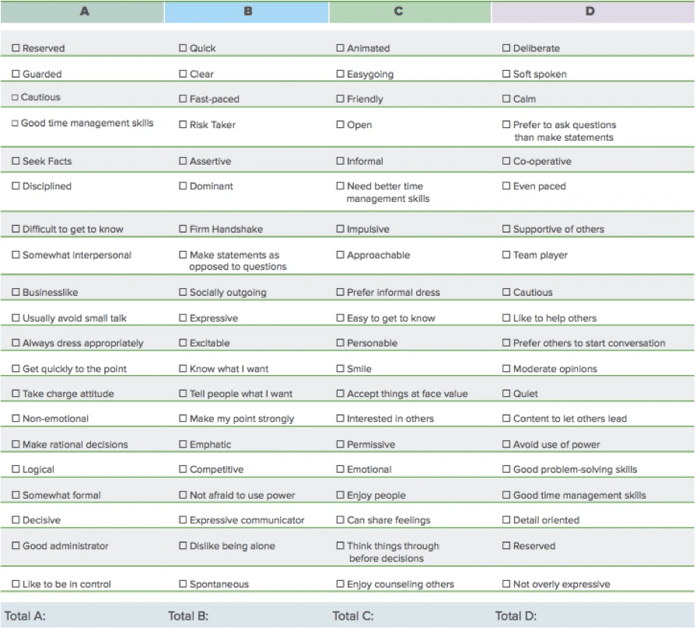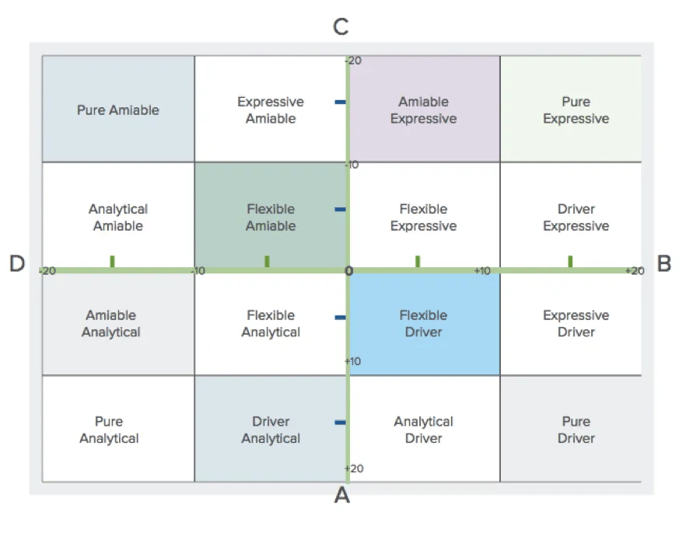While there's no definitive standard for segmenting salespeople, there are some archetypes that sales professionals tend to fall into — categories that can help reps better understand how they sell and what they should work on.

Those categories are known as selling styles, and there are four that can capture the nature of almost every salesperson's professional qualities and personal inclinations. Most of us are a combination of two or more styles, but every sales professional has one that stands out from the rest.
Here you'll get some more perspective on what selling styles are, learn about those four main categories, and take a quiz that can tell you which one fits you best.
What's a selling style?
A selling style is an archetype that describes the general nature of how a sales rep sells and conducts themselves professionally. While selling styles aren't definitive and many reps' sales efforts feature qualities from more than one, they're helpful standards for both reps and their managers to reference.
Selling styles aren't set in stone. They're not binding profiles that can tell you everything about how you conduct yourself as a salesperson. Still, they can offer some interesting perspective on what you do well and the strategies you can implement to take your sales efforts to the next level.
And while your results should be taken with a grain of salt, it's still worth it to take a look at where you land.
Here are the four primary selling styles that most sales reps fall into.
Selling Styles
- Repairperson
- Shopkeeper
- Hunter
- Farmer
1. Repairperson
The repairperson is at their best when solving a customer’s problem and will usually take a consultative approach to selling. They often come to sales after being an engineer, accountant, computer analyst, or some other technical profession.;
They are most comfortable when dealing with people with similar business backgrounds and technical expertise. For instance, an accountant will be more comfortable dealing with another accountant — or an engineer with an engineer. This allows them to display their superior technical abilities and "repair" the other person’s problem.
2. Shopkeeper
Shopkeepers have a pleasant personality and delight in helping people. They're not particularly inclined to uncover needs, but if the prospect knows what they want, the shopkeeper can find it for them.
These salespeople like to be of service, and helping others is their strong suit. They’re more comfortable working in inside sales than others on this list, and they can often be found in retail sales or inbound telemarketing.
3. Hunter
Hunters thrive on seeking out new opportunities and opening doors. Hunters are likely to be self-assured, aggressive, highly focused, and driven. They're the stereotypical "heavy-hitters." Their eyes and minds are always on the horizon looking for the next kill.
As a result, even in good times, they’ll miss some opportunities lying at their feet. They tend to leave some half-alive opportunities in their wake. Having said that, they’re good people to have around when the sales funnel is empty.
4. Farmer
Farmers are good at technical, team, relationship, and consultative selling. They’re the masters of smooth, soft selling and are not afraid to ask for a prospect's business. They are outgoing salespeople and big dreamers — sales reps with contagious enthusiasm and big personalities.
Farmers often go out of their way to help customers because they believe in the value of maintaining relationships. They sell intuitively with an emphasis on social interaction and a focus on having a good time.
Take this quiz to find your selling style.
As you read down the columns (A to D), check all the words and phrases that you feel describe you. Once complete, add up the total number in each column.

Now, you should have a number in each column. Next, subtract the C total from the A total. Do the same for the D total from the B total:
- A - C = _____
- B - D = _____
With these numbers, plot your results on the graph below.
A and C represent your y-axis. If A – C results in a positive number, plot the result on the y-axis below the (0) center, and if negative, above the (0) center.
B and D represent your x-axis. If B – D results in a positive number, plot your result on the x-axis to the right of the (0) center, and if negative, on the left side of the (0) center.

Finally, match up your results with the four styles below:
Primarily Analytical: Repairperson
Repairpeople thrive when talking to a prospect with similar technical knowledge, but they often run into trouble when interacting with non-technical decision-makers. They tend to get frustrated with prospects who have a more passive understanding of their product or industry.
Repairpeople are ideal for technical and consultative sales. They also prefer taking a soft-sell approach. They tend to be colder and more objective with prospects — believing that products should be sold on their merit as opposed to reps' personalities.
These salespeople tend to methodically focus on each detail required to complete the sale. They aren't comfortable selling without a comprehensive knowledge of their offering or supporting technical materials closeby. Repairpeople want presentations to be perfect — an inclination that can have both positive and negative ramifications.
On one hand, it makes for more thorough, successful technical presentations. On the other, it can reduce the number of resulting presentations and sales they conduct and land.
If you are an analytical repairperson, here are some things you can do to easily adjust your personality style:
- Be more outgoing.
- Share ideas and information with others.
- Look for the positive in ideas.
- Avoid giving too much detail.
- Display sincere interest in others.
Primarily Amiable: Shopkeeper
Shopkeepers are generally warm, friendly, and service-oriented. They are often introverts and can be sensitive — sometimes to a fault. They often feel they must be liked and respected by their prospects. Sometimes, this makes them come across as being overbearing.
Shopkeepers are best suited for inside sales. They prefer to respond to others rather than initiate first contact, so practices like cold calling can be particularly difficult for them.
These salespeople don't like to be perceived as pushy or aggressive and would prefer to make friends with customers than jeopardize the relationship by being too assertive. As a result, shopkeepers don’t make sales — they wait for customers to buy.
Shopkeepers are at their best in a team selling or customer service role. They will bend over backward to help others but might give away too much if they’re not careful. They like to be liked and are very careful to not offend others.
That often makes shopkeepers have a more passive approach to selling where they want to establish a relationship before attempting to sell. That reluctance to be assertive means some sales never get started.
If you are an amiable shopkeeper, here are some things you can do to easily adjust your personality style:
- Speed up your pace of speaking.
- Let people know what you want.
- Don’t become overly friendly.
- Talk less.
- Get involved and take control.
Primarily Driven: Hunter
When times are tight and sales opportunities are sparse, the Hunter will forge into new sales territories and find new prospects. They're most effective when given the space to hunt indiscriminately and bring in anything they can find. Unfortunately, that often leads to these salespeople valuing quantity over quality with the opportunities they identify.
Hunters need to work with their sales managers to jointly determine which opportunities should be pursued and which should be given a decent burial. They also tend to resent bureaucracy and paperwork more than most other salespeople, so many fail to keep detailed records of their sales efforts.
In turn, they're diligent when it comes to staying on top of their opportunities, but their managers are often kept in the dark. When it comes to sales techniques, hunters aren’t particularly creative. They prefer planned, proven, and direct approaches to pursuing opportunities.
They're decisive, bold, and blunt in their efforts to close a sale. That said, hunters can be assertive to the point of aggressiveness and can come across as pushy.
If you are a driven hunter, here are some things you can do to easily adjust your personality style:
- Slow down with people who speak slowly.
- Make an effort to listen to others' ideas.
- Be careful not to dominate.
- Allow others to have some control.
- Show more patience.
Primarily Expressive: Farmer
Farmers thrive on nurturing and maintaining accounts or opportunities. Once they have a lead, these sellers spring into action, make contacts, and burrow their way into the account. They're at their best when times are looking up and the sales ground is fertile.
But when times are tough and there aren't real opportunities to work on, farmers tend to stand around, complain about the sales drought, and wish for better weather.
Unlike the hunter, farmers aren't motivated by sales slumps. They're more inclined to hunker down and tough it out rather than go out and make something happen.
Sometimes, getting farmers out of their barns is a challenge. They’d rather write letters, service marginal accounts, and make plans than start something new.
Farmers often take a very creative approach to speech and writing in their attempts to persuade the customer to buy — giving dynamic presentations and conducting thoughtful outreach.
But that creativity and energy can come with a less-than-ideal territory. Sometimes, farmers can come across as excitable, impatient, or superficial. If they want to get the most out of their sales efforts, farmers need to listen to what their prospects really want before they start selling.
If you are an expressive farmer, here are some things you can do to easily adjust your personality style:
- Be careful not to talk too much, and listen more.
- Adjust your pace to the other person’s.
- Be less social.
- Look before you leap; check details.
- Stay focused.
As I mentioned, these styles aren't always accurate and are by no means definitive. You'll probably pull certain qualities from more than one of the categories listed above.
Still, having a picture of your selling style can be valuable in its own right. Understanding the style you found from this quiz might make you hip some unconsidered professional strengths or tendencies that might need some work.




![[New Data] 7 Actionable Habits of Top Sales Performers](https://blog.hubspot.com/hubfs/habits-top-salespeople%20%281%29.jpg)






